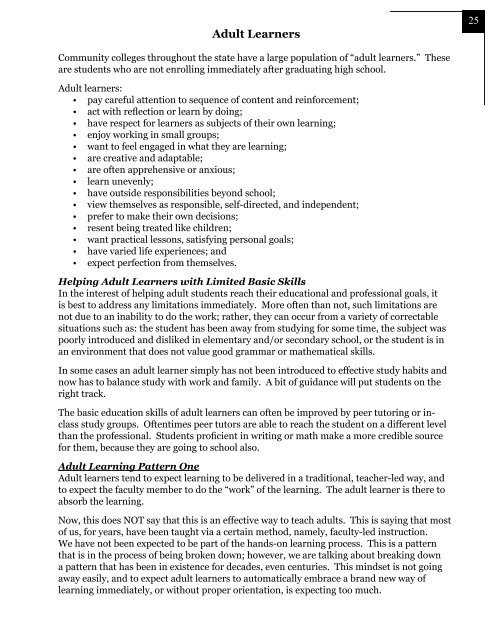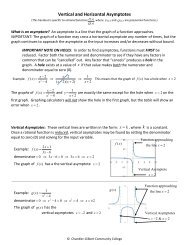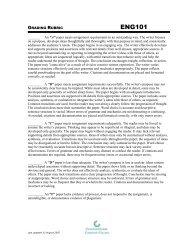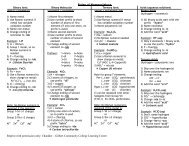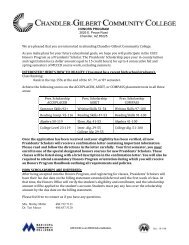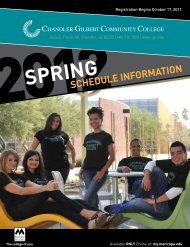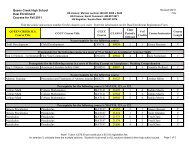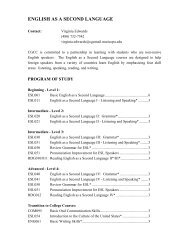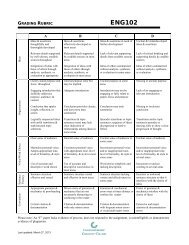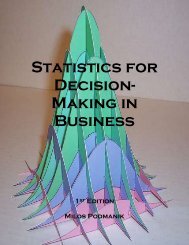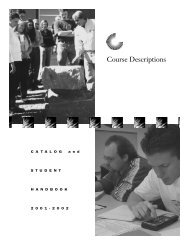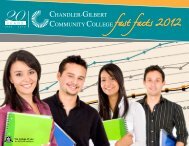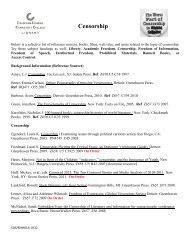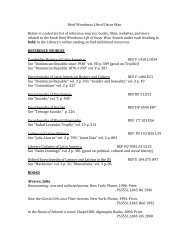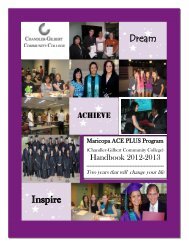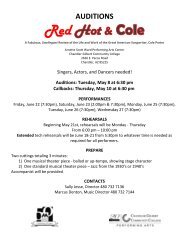Tutor Training Manual.indd - Chandler-Gilbert Community College
Tutor Training Manual.indd - Chandler-Gilbert Community College
Tutor Training Manual.indd - Chandler-Gilbert Community College
Create successful ePaper yourself
Turn your PDF publications into a flip-book with our unique Google optimized e-Paper software.
Adult Learners<br />
25<br />
<strong>Community</strong> colleges throughout the state have a large population of “adult learners.” These<br />
are students who are not enrolling immediately after graduating high school.<br />
Adult learners:<br />
• pay careful attention to sequence of content and reinforcement;<br />
• act with reflection or learn by doing;<br />
• have respect for learners as subjects of their own learning;<br />
• enjoy working in small groups;<br />
• want to feel engaged in what they are learning;<br />
• are creative and adaptable;<br />
• are often apprehensive or anxious;<br />
• learn unevenly;<br />
• have outside responsibilities beyond school;<br />
• view themselves as responsible, self-directed, and independent;<br />
• prefer to make their own decisions;<br />
• resent being treated like children;<br />
• want practical lessons, satisfying personal goals;<br />
• have varied life experiences; and<br />
• expect perfection from themselves.<br />
Helping Adult Learners with Limited Basic Skills<br />
In the interest of helping adult students reach their educational and professional goals, it<br />
is best to address any limitations immediately. More often than not, such limitations are<br />
not due to an inability to do the work; rather, they can occur from a variety of correctable<br />
situations such as: the student has been away from studying for some time, the subject was<br />
poorly introduced and disliked in elementary and/or secondary school, or the student is in<br />
an environment that does not value good grammar or mathematical skills.<br />
In some cases an adult learner simply has not been introduced to effective study habits and<br />
now has to balance study with work and family. A bit of guidance will put students on the<br />
right track.<br />
The basic education skills of adult learners can often be improved by peer tutoring or inclass<br />
study groups. Oftentimes peer tutors are able to reach the student on a different level<br />
than the professional. Students proficient in writing or math make a more credible source<br />
for them, because they are going to school also.<br />
Adult Learning Pattern One<br />
Adult learners tend to expect learning to be delivered in a traditional, teacher-led way, and<br />
to expect the faculty member to do the “work” of the learning. The adult learner is there to<br />
absorb the learning.<br />
Now, this does NOT say that this is an effective way to teach adults. This is saying that most<br />
of us, for years, have been taught via a certain method, namely, faculty-led instruction.<br />
We have not been expected to be part of the hands-on learning process. This is a pattern<br />
that is in the process of being broken down; however, we are talking about breaking down<br />
a pattern that has been in existence for decades, even centuries. This mindset is not going<br />
away easily, and to expect adult learners to automatically embrace a brand new way of<br />
learning immediately, or without proper orientation, is expecting too much.


